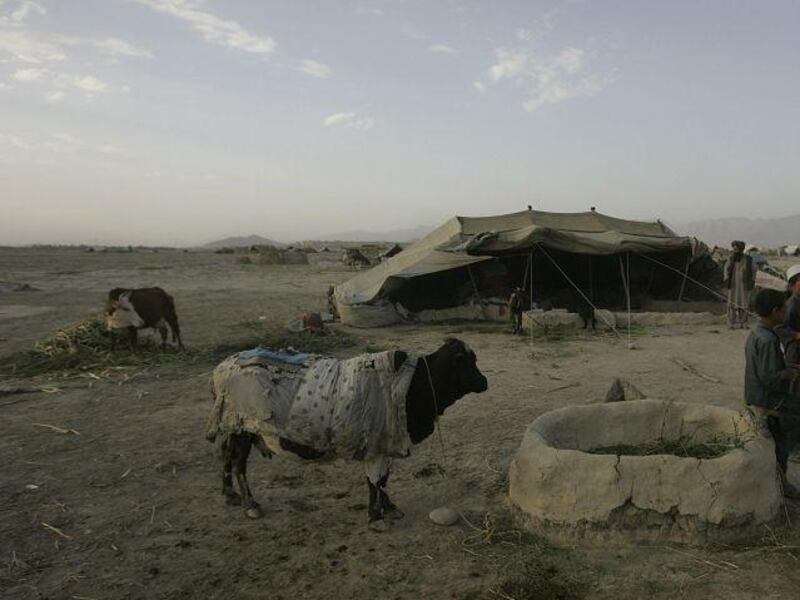KABUL // Members of Afghanistan's nomad community warn they will resort to violent resistance unless the government does more to ensure protection of their basic rights. Speaking on a sprawling plain on the outskirts of Kabul province, they accused officials of turning a blind eye while a local militia commander terrorised their families and stole land that is historically theirs.
"There is no difference between this government and the Taliban regime. The Taliban didn't do anything to defend us and this government doesn't either. But at least the Taliban never did this and there were no warlords around to take our land or beat the people," said Sana Gul, a father of eight. Afghanistan's approximately five million nomads are known as Kuchis and they can be found across much of the country, often moving away from the south and east when the weather heats up in the spring.
Despite wandering freely with their livestock in tow, and rarely settling anywhere, many have decades-old deeds to land where they live for short periods of time each year. Here, by the road leading from Kabul to Maidan Wardak province, the Kuchis are concerned that their way of life is under threat as never before. They accuse a local warlord, Haji Sher Alam, of waging a campaign of intimidation against the community.
In one incident, his militia is accused of arresting eight people and holding them in a private jail. Kuchis allege that his men have physically attacked them. But even more importantly, as far as these nomads are concerned, they allege that he sold off plots of their land for real estate development. "If we don't have a place to live, where should we go? The sky? We have fought several times with Sher Alam, but what can we do? He has guns, soldiers and pick-up vehicles; we have sticks," Mr Gul said.
"If the government doesn't give us land here or anywhere else, then we will fight and we will kill ourselves. It is better to die than to have no land." Unrest between Kuchis and other Afghan communities is relatively common throughout the country. Much of the time the violence is short-lived, but occasionally it can lead to intense, prolonged fighting that threatens to become more serious. Last summer, a series of clashes in Maidan Wardak between nomads and members of the Hazara ethnic group displaced thousands of people. There were protests on the streets of Kabul and a leading Hazara member of parliament warned that a civil war could break out.
This latest dispute threatens about 500 families and is indicative of a wider problem plaguing Afghanistan. When the Taliban government collapsed, it took with it a harsh, but ultimately effective, justice system. Now, there is a culture of impunity and it has resulted in growing lawlessness. Mr Alam is reported to be one of Abdul Raab Rasul Sayyaf's commanders. Mr Sayyaf is an MP who played a prominent role in the civil war that destroyed Kabul during the early and mid-1990s. But Mr Sayyaf, like many of his old colleagues, is effectively above the law. Accusations abound that he is still involved in human rights abuses, but little is ever done to investigate the claims.
Dawlat Khan, a 40-year-old Kuchi, warned that they would "stand against the government" unless their concerns are addressed. "During the Russian time, the mujahideen time and the Taliban time, no one did this. Now these people have returned, got some [official] positions and they are saying this is their land," he said. "Of course the Kuchis will start fighting as well. Two days ago there was a problem [in another part of Kabul] because the Kuchis went there and the Hazaras were complaining. But where else should we go? Should we go underground? We are also from Afghanistan."
Mahmood Khan Sulemankhel runs the government department responsible for Kuchis. He said it was still unclear whether the land belonged to Mr Alam or the nomads. The complaints of the people are, though, just a small part of a larger issue. "If they take land which is for the Kuchis and their animals and build houses on it, then we don't have any other land for them. This will cause lots of problem and it could finish the Kuchis," he said.
However, he called for any disputes to be tackled peacefully, through meetings between community leaders, not by armed resistance. "We are trying to solve all the problems Kuchis have around the country without fighting, but with the help of jirgas [meetings]. Fighting is not the solution and we will also not let other people take away the rights of Kuchis by force. We will not talk in the language of the gun," Mr Sulemankhel said.
skarim@thenational.ae





